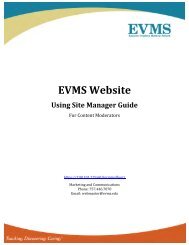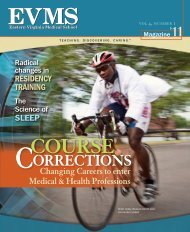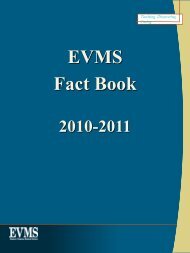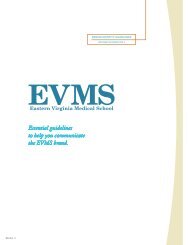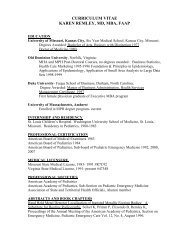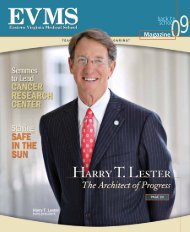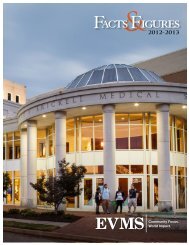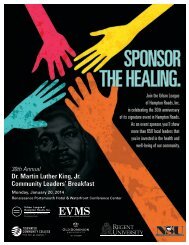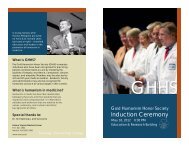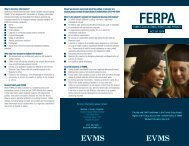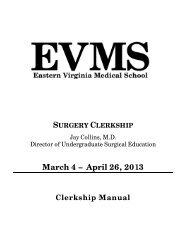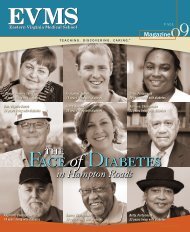Fall 2010 - Eastern Virginia Medical School
Fall 2010 - Eastern Virginia Medical School
Fall 2010 - Eastern Virginia Medical School
You also want an ePaper? Increase the reach of your titles
YUMPU automatically turns print PDFs into web optimized ePapers that Google loves.
EVMS professoruncovers hidden trendof sad dadsIn 2004, while working on a large nationalstudy of factors influencing parenting behavior,James F. Paulson, PhD, associate professor ofpediatrics and child psychologist at <strong>Eastern</strong><strong>Virginia</strong> <strong>Medical</strong> <strong>School</strong>, stumbled upon aninteresting and little-known phenomenon —postpartum depression in dads.“We were interested in depression in mothers,as that was a known factor of parentingproblems. We just so happened to have ameasure of depression in dads, so we decidedto include it just to better understand the wholepicture,” Dr. Paulson says. “What we found andhave confirmed through a number of studiesis that expecting and new fathers experiencedepression at rates that are disproportionate tothe general population.”Dr. Paulson and his research team thenstarted examining all of the research availableon the topic and found that one out of every10 fathers experiences depression sometimebetween the start of pregnancy through oneyear after birth. This is more than doublethe 4.8 percent of men in the general publicexperiencing depression. The lowest rates ofdepression (7.7 percent) occur in the first threemonths postpartum, and the highest rates (25.6percent) occur in the 3- to 6-month postpartumperiod.The findings of the study were published inthe May 19 issue of the Journal of the American<strong>Medical</strong> Association. In the article, Dr. Paulsonand co-author Sharnail Bazemore, MS, aresearch associate in pediatrics, examine theJames F. Paulson, PhDprevalence of prenatal and postnatal depressionin fathers, its impact on child development andhow it correlates with depression in mothers.“We’ve seen that they are actually quitestrongly correlated,” Dr. Paulson says. “Whenmoms are depressed, dads are more likely tobe depressed, or vice versa. We don’t know yetwhich direction the effect goes.”Dr. Paulson and his team also have beenstudying how depression impacts parentingbehaviors. He says depressed fathers interactless with their children, which can hamper thechild’s development. There are also studies thatshow behavior problems in young children withdepressed dads. But Dr. Paulson says furtherresearch needs to be done.“There isn’t a lot of research going on,” hesays. “The cool thing about this is it’s a smallfield of researchers, and EVMS is one of the fewplaces in the world that’s involved in this kindof work, at this level.”His team recently received a $420,000research grant from the National Instituteof Child Health and Human Developmentto fund a two-year study of Hampton Roadsresidents, examining depression in both parents,from the beginning of the third trimesterthrough six months postpartum.“In terms of understanding child outcomes,it makes mores sense to look at how the familyfunctions as a whole rather than looking atindividuals,” he says. “Looking at depression indads really opens the door to understanding thisas a family phenomenon.”Research identifiespossible newway to easeinsomniaA study by Daniel A. Bluestein, MD, professorof family and community medicine at <strong>Eastern</strong><strong>Virginia</strong> <strong>Medical</strong> <strong>School</strong>, and colleaguesat the Old Dominion University <strong>School</strong> ofNursing showsa link betweeninsomnia andpatients whodon’t b elievethey can changetheir behaviorsto improve sleep.I n s o m n i ahas long beenassociated withDaniel A. Bluestein, MDdepression, butthere has beenlittle research linking insomnia and one’s lack of“self-efficacy” — the belief and confidence thatone can improve his or her own health throughone’s own actions. In this study, funded by agrant from the American Academy of FamilyPhysicians Foundation and published in theJournal of the American Board of Family Medicine,low self-efficacy for achieving sleep-improvingbehaviors was an even stronger predictor ofinsomnia severity than levels of depression. Thesefindings illuminate a potential new method fortreating the condition.“Clinicians caring for insomnia patients knowto look for depression,” Dr. Bluestein says. “Theassociation with self-efficacy, however, is lesswell-known and suggests the need for researchinto whether boosting a patient’s self-efficacy canease his or her insomnia symptoms.”This research would evaluate strategies forincreasing self-efficacy such as peer learning,group discussions and what is known asmotivational interviewing — helping someoneweigh the pros and cons of taking or not takinga certain course of action.newswww.evms.edu FALL <strong>2010</strong> 7



